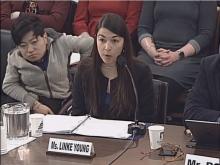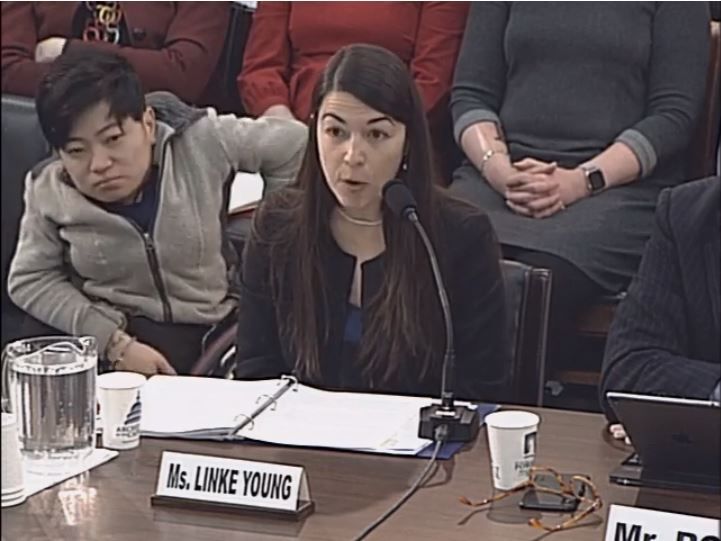User login
If Republican state attorneys general prevail in their legal bid to overturn the Affordable Care Act, patients with preexisting conditions will lose their coverage protections, and an additional 24 million Americans could become uninsured, according to testimony presented at a Feb. 6 hearing of the House Energy and Commerce Health Subcommittee.
A ruling for the plaintiffs in Texas v. United States also would mean the ACA’s consumer protections for employer-based coverage would be eliminated, affecting more than 150 million Americans, said Christen Linke Young, an attorney and fellow for the liberal-leaning USC-Brookings Schaeffer Initiative on Health Policy.
“The ACA’s changes to Medicare would be undone, reinstating copays on preventive services and reopening the prescription drug ‘donut hole,’ ” Ms. Young testified at the hearing. “It would also create major confusion in Medicare payment, as the ACA policies that are today fully integrated into the Medicare payment rules would suddenly lack a legislative basis.”
Ms. Linke Young was one of five witnesses who testified before lawmakers about the implications of Texas v. United States, an ongoing legal case that centers on whether a part of the health care law should be severed and if so, whether the entire law should then fall.
A group of Republican state attorneys general sued over the law in 2018, arguing that, because budget legislation in 2017 zeroed out the penalties associated with the ACA’s individual mandate, the mandate is invalid. The attorneys general also argue that, if the mandate is severed, the entire ACA should be struck down.
In response to the suit, the Trump administration agreed that the mandate is unconstitutional and should be parsed. Attorneys for the administration wrote that, if the mandate is found unconstitutional, the court should also consider finding two other provisions – the guaranteed issue and community rating requirements – of the ACA invalid. Guaranteed issue refers to insurers in the individual market offering coverage to all citizens, regardless of preexisting conditions, while community rating refers to charging equal premiums to every patient, no matter their past health status. The remainder of the ACA can stand without the three linked provisions, according to the Trump administration, which refused to defend the case.
A coalition of 17 Democratic attorneys general have stepped in to defend the case.
In December, a district court declared the entire ACA to be invalid, a decision immediately appealed to the 5th Circuit by the Democratic attorneys general. In January, the circuit court froze the case in light of the federal government’s partial shutdown. The case remains on hold.
At the hearing, Thomas P. Miller, a resident fellow at the conservative-leaning American Enterprise Institute, testified that a 5th Circuit decision would not likely come before summer 2019, followed by a potential U.S. Supreme Court reading in 2020 – if the case gets that far.
“The probability of a Supreme Court ruling that would overturn the entire ACA remains very low, despite last December’s decision at the federal district court level reaching exactly that legal conclusion,” Mr. Miller testified. “Given the murkiness of divining legislative intent in harder cases like the ACA, challenges to the individual mandate, past and present, it’s better to conclude that, although several different severability settings are hypothetically conceivable, it remains all but certain that an ultimate Supreme Court ruling in this case will, at a minimum, follow its previous inclinations revealed in the 2012 and 2015 ACA challenges and try to save as much of the law as possible.”
If the individual mandate is ultimately severed from the ACA, the decision would have little impact on beneficiaries or function of the health care law, according to Simon Lazarus, a lawyer and writer on constitutional and legal issues.
“Such a result will have virtually no impact on the operation of the ACA, nor on the millions of Americans – in reality, substantially all Americans – who depend on the ACA and its guarantees for people with preexisting conditions and myriad other protections that now are ‘baked into’ the national health care system,” Mr. Lazarus testified at the hearing. “To declare invalid the law’s shared responsibility payment provision, when that provision has no financial penalty behind it, will, by itself, have little if any depressive effect on the number of enrollees in health insurance plans.”
However, Mr. Lazarus noted that the guaranteed issue and community rating provisions of the law are “critical protections” for people with preexisting conditions.
Avik Roy, president for the Foundation for Research on Equal Opportunity, a nonpartisan organization that supports universal health care, testified that the Trump administration’s position about the mandate being tied to the guaranteed issue and community rating provisions is being mischaracterized as implying the administration opposes protecting people with preexisting conditions. President Trump has repeatedly expressed that any reforms or replacements of the ACA cover those with preexisting conditions, he said.
Mr. Roy recommended that Congress pass a bill reiterating the guaranteed issue and community rating requirements in the individual market to ensure protection for patients with preexisting conditions in light of Texas v. United States.
“I understand that a motion to produce such legislation was proposed by House Republicans during floor debate at the beginning of this Congress, [a bill] that would guarantee that no American could be denied coverage, or be charged higher premiums or cost sharing, as a result of a previous or current illness – and that the motion was defeated by the majority,” Mr. Roy testified. To me, this is a shame, as such legislation would ensure that Americans with preexisting conditions would be protected whatever the courts decide. I hope that Congress will reconsider its position.”
A number of subcommittee members pledged their support for protecting people with preexisting conditions and encouraged discussion of further legislation proposals.
“Let me speak on behalf of Republicans; we fully support protecting Americans with preexisting conditions,” said Rep. Greg Walden (R-Ore.), ranking member of the full committee. “We’ve said this repeatedly, we’ve acted accordingly, and we mean it completely. We could and should inject certainly into the system by passing legislation to protect those with preexisting conditions.”
Rep. Michael Burgess, MD, (R-Texas) questioned why the subcommittee was having a hearing on Texas v. United States, rather than focusing on making specific health policy improvements.
“It’s unfortunate we’re having a hearing that doesn’t move toward the development of any policies that will actually improve health care for Americans,” Rep. Burgess said during the hearing. “To that effect, there are numerous options that you could bring before us that could moot [Texas v. United States], but the subcommittee apparently has chosen not to do so.”
Committee Chairman Frank Pallone Jr. (D-N.J.), who called for the hearing, took offense at Rep. Burgess’ statements, expressing the importance of the hearing and the case at large.
“I saw no effort at all in the time that you were the chairman [of the health subcommittee] to try to work toward solutions in improving the ACA,” Rep. Pallone said. “What I saw were constant efforts to join with President Trump to sabotage it. ... and the reason that this hearing is so important is because the ultimate sabotage would be to have the courts rule that the ACA was unconstitutional, which is totally bogus.”
The Subcommittee on Health will hold another hearing on Feb. 13 to discuss ACA legislation and protections for patients with preexisting conditions.
If Republican state attorneys general prevail in their legal bid to overturn the Affordable Care Act, patients with preexisting conditions will lose their coverage protections, and an additional 24 million Americans could become uninsured, according to testimony presented at a Feb. 6 hearing of the House Energy and Commerce Health Subcommittee.
A ruling for the plaintiffs in Texas v. United States also would mean the ACA’s consumer protections for employer-based coverage would be eliminated, affecting more than 150 million Americans, said Christen Linke Young, an attorney and fellow for the liberal-leaning USC-Brookings Schaeffer Initiative on Health Policy.
“The ACA’s changes to Medicare would be undone, reinstating copays on preventive services and reopening the prescription drug ‘donut hole,’ ” Ms. Young testified at the hearing. “It would also create major confusion in Medicare payment, as the ACA policies that are today fully integrated into the Medicare payment rules would suddenly lack a legislative basis.”
Ms. Linke Young was one of five witnesses who testified before lawmakers about the implications of Texas v. United States, an ongoing legal case that centers on whether a part of the health care law should be severed and if so, whether the entire law should then fall.
A group of Republican state attorneys general sued over the law in 2018, arguing that, because budget legislation in 2017 zeroed out the penalties associated with the ACA’s individual mandate, the mandate is invalid. The attorneys general also argue that, if the mandate is severed, the entire ACA should be struck down.
In response to the suit, the Trump administration agreed that the mandate is unconstitutional and should be parsed. Attorneys for the administration wrote that, if the mandate is found unconstitutional, the court should also consider finding two other provisions – the guaranteed issue and community rating requirements – of the ACA invalid. Guaranteed issue refers to insurers in the individual market offering coverage to all citizens, regardless of preexisting conditions, while community rating refers to charging equal premiums to every patient, no matter their past health status. The remainder of the ACA can stand without the three linked provisions, according to the Trump administration, which refused to defend the case.
A coalition of 17 Democratic attorneys general have stepped in to defend the case.
In December, a district court declared the entire ACA to be invalid, a decision immediately appealed to the 5th Circuit by the Democratic attorneys general. In January, the circuit court froze the case in light of the federal government’s partial shutdown. The case remains on hold.
At the hearing, Thomas P. Miller, a resident fellow at the conservative-leaning American Enterprise Institute, testified that a 5th Circuit decision would not likely come before summer 2019, followed by a potential U.S. Supreme Court reading in 2020 – if the case gets that far.
“The probability of a Supreme Court ruling that would overturn the entire ACA remains very low, despite last December’s decision at the federal district court level reaching exactly that legal conclusion,” Mr. Miller testified. “Given the murkiness of divining legislative intent in harder cases like the ACA, challenges to the individual mandate, past and present, it’s better to conclude that, although several different severability settings are hypothetically conceivable, it remains all but certain that an ultimate Supreme Court ruling in this case will, at a minimum, follow its previous inclinations revealed in the 2012 and 2015 ACA challenges and try to save as much of the law as possible.”
If the individual mandate is ultimately severed from the ACA, the decision would have little impact on beneficiaries or function of the health care law, according to Simon Lazarus, a lawyer and writer on constitutional and legal issues.
“Such a result will have virtually no impact on the operation of the ACA, nor on the millions of Americans – in reality, substantially all Americans – who depend on the ACA and its guarantees for people with preexisting conditions and myriad other protections that now are ‘baked into’ the national health care system,” Mr. Lazarus testified at the hearing. “To declare invalid the law’s shared responsibility payment provision, when that provision has no financial penalty behind it, will, by itself, have little if any depressive effect on the number of enrollees in health insurance plans.”
However, Mr. Lazarus noted that the guaranteed issue and community rating provisions of the law are “critical protections” for people with preexisting conditions.
Avik Roy, president for the Foundation for Research on Equal Opportunity, a nonpartisan organization that supports universal health care, testified that the Trump administration’s position about the mandate being tied to the guaranteed issue and community rating provisions is being mischaracterized as implying the administration opposes protecting people with preexisting conditions. President Trump has repeatedly expressed that any reforms or replacements of the ACA cover those with preexisting conditions, he said.
Mr. Roy recommended that Congress pass a bill reiterating the guaranteed issue and community rating requirements in the individual market to ensure protection for patients with preexisting conditions in light of Texas v. United States.
“I understand that a motion to produce such legislation was proposed by House Republicans during floor debate at the beginning of this Congress, [a bill] that would guarantee that no American could be denied coverage, or be charged higher premiums or cost sharing, as a result of a previous or current illness – and that the motion was defeated by the majority,” Mr. Roy testified. To me, this is a shame, as such legislation would ensure that Americans with preexisting conditions would be protected whatever the courts decide. I hope that Congress will reconsider its position.”
A number of subcommittee members pledged their support for protecting people with preexisting conditions and encouraged discussion of further legislation proposals.
“Let me speak on behalf of Republicans; we fully support protecting Americans with preexisting conditions,” said Rep. Greg Walden (R-Ore.), ranking member of the full committee. “We’ve said this repeatedly, we’ve acted accordingly, and we mean it completely. We could and should inject certainly into the system by passing legislation to protect those with preexisting conditions.”
Rep. Michael Burgess, MD, (R-Texas) questioned why the subcommittee was having a hearing on Texas v. United States, rather than focusing on making specific health policy improvements.
“It’s unfortunate we’re having a hearing that doesn’t move toward the development of any policies that will actually improve health care for Americans,” Rep. Burgess said during the hearing. “To that effect, there are numerous options that you could bring before us that could moot [Texas v. United States], but the subcommittee apparently has chosen not to do so.”
Committee Chairman Frank Pallone Jr. (D-N.J.), who called for the hearing, took offense at Rep. Burgess’ statements, expressing the importance of the hearing and the case at large.
“I saw no effort at all in the time that you were the chairman [of the health subcommittee] to try to work toward solutions in improving the ACA,” Rep. Pallone said. “What I saw were constant efforts to join with President Trump to sabotage it. ... and the reason that this hearing is so important is because the ultimate sabotage would be to have the courts rule that the ACA was unconstitutional, which is totally bogus.”
The Subcommittee on Health will hold another hearing on Feb. 13 to discuss ACA legislation and protections for patients with preexisting conditions.
If Republican state attorneys general prevail in their legal bid to overturn the Affordable Care Act, patients with preexisting conditions will lose their coverage protections, and an additional 24 million Americans could become uninsured, according to testimony presented at a Feb. 6 hearing of the House Energy and Commerce Health Subcommittee.
A ruling for the plaintiffs in Texas v. United States also would mean the ACA’s consumer protections for employer-based coverage would be eliminated, affecting more than 150 million Americans, said Christen Linke Young, an attorney and fellow for the liberal-leaning USC-Brookings Schaeffer Initiative on Health Policy.
“The ACA’s changes to Medicare would be undone, reinstating copays on preventive services and reopening the prescription drug ‘donut hole,’ ” Ms. Young testified at the hearing. “It would also create major confusion in Medicare payment, as the ACA policies that are today fully integrated into the Medicare payment rules would suddenly lack a legislative basis.”
Ms. Linke Young was one of five witnesses who testified before lawmakers about the implications of Texas v. United States, an ongoing legal case that centers on whether a part of the health care law should be severed and if so, whether the entire law should then fall.
A group of Republican state attorneys general sued over the law in 2018, arguing that, because budget legislation in 2017 zeroed out the penalties associated with the ACA’s individual mandate, the mandate is invalid. The attorneys general also argue that, if the mandate is severed, the entire ACA should be struck down.
In response to the suit, the Trump administration agreed that the mandate is unconstitutional and should be parsed. Attorneys for the administration wrote that, if the mandate is found unconstitutional, the court should also consider finding two other provisions – the guaranteed issue and community rating requirements – of the ACA invalid. Guaranteed issue refers to insurers in the individual market offering coverage to all citizens, regardless of preexisting conditions, while community rating refers to charging equal premiums to every patient, no matter their past health status. The remainder of the ACA can stand without the three linked provisions, according to the Trump administration, which refused to defend the case.
A coalition of 17 Democratic attorneys general have stepped in to defend the case.
In December, a district court declared the entire ACA to be invalid, a decision immediately appealed to the 5th Circuit by the Democratic attorneys general. In January, the circuit court froze the case in light of the federal government’s partial shutdown. The case remains on hold.
At the hearing, Thomas P. Miller, a resident fellow at the conservative-leaning American Enterprise Institute, testified that a 5th Circuit decision would not likely come before summer 2019, followed by a potential U.S. Supreme Court reading in 2020 – if the case gets that far.
“The probability of a Supreme Court ruling that would overturn the entire ACA remains very low, despite last December’s decision at the federal district court level reaching exactly that legal conclusion,” Mr. Miller testified. “Given the murkiness of divining legislative intent in harder cases like the ACA, challenges to the individual mandate, past and present, it’s better to conclude that, although several different severability settings are hypothetically conceivable, it remains all but certain that an ultimate Supreme Court ruling in this case will, at a minimum, follow its previous inclinations revealed in the 2012 and 2015 ACA challenges and try to save as much of the law as possible.”
If the individual mandate is ultimately severed from the ACA, the decision would have little impact on beneficiaries or function of the health care law, according to Simon Lazarus, a lawyer and writer on constitutional and legal issues.
“Such a result will have virtually no impact on the operation of the ACA, nor on the millions of Americans – in reality, substantially all Americans – who depend on the ACA and its guarantees for people with preexisting conditions and myriad other protections that now are ‘baked into’ the national health care system,” Mr. Lazarus testified at the hearing. “To declare invalid the law’s shared responsibility payment provision, when that provision has no financial penalty behind it, will, by itself, have little if any depressive effect on the number of enrollees in health insurance plans.”
However, Mr. Lazarus noted that the guaranteed issue and community rating provisions of the law are “critical protections” for people with preexisting conditions.
Avik Roy, president for the Foundation for Research on Equal Opportunity, a nonpartisan organization that supports universal health care, testified that the Trump administration’s position about the mandate being tied to the guaranteed issue and community rating provisions is being mischaracterized as implying the administration opposes protecting people with preexisting conditions. President Trump has repeatedly expressed that any reforms or replacements of the ACA cover those with preexisting conditions, he said.
Mr. Roy recommended that Congress pass a bill reiterating the guaranteed issue and community rating requirements in the individual market to ensure protection for patients with preexisting conditions in light of Texas v. United States.
“I understand that a motion to produce such legislation was proposed by House Republicans during floor debate at the beginning of this Congress, [a bill] that would guarantee that no American could be denied coverage, or be charged higher premiums or cost sharing, as a result of a previous or current illness – and that the motion was defeated by the majority,” Mr. Roy testified. To me, this is a shame, as such legislation would ensure that Americans with preexisting conditions would be protected whatever the courts decide. I hope that Congress will reconsider its position.”
A number of subcommittee members pledged their support for protecting people with preexisting conditions and encouraged discussion of further legislation proposals.
“Let me speak on behalf of Republicans; we fully support protecting Americans with preexisting conditions,” said Rep. Greg Walden (R-Ore.), ranking member of the full committee. “We’ve said this repeatedly, we’ve acted accordingly, and we mean it completely. We could and should inject certainly into the system by passing legislation to protect those with preexisting conditions.”
Rep. Michael Burgess, MD, (R-Texas) questioned why the subcommittee was having a hearing on Texas v. United States, rather than focusing on making specific health policy improvements.
“It’s unfortunate we’re having a hearing that doesn’t move toward the development of any policies that will actually improve health care for Americans,” Rep. Burgess said during the hearing. “To that effect, there are numerous options that you could bring before us that could moot [Texas v. United States], but the subcommittee apparently has chosen not to do so.”
Committee Chairman Frank Pallone Jr. (D-N.J.), who called for the hearing, took offense at Rep. Burgess’ statements, expressing the importance of the hearing and the case at large.
“I saw no effort at all in the time that you were the chairman [of the health subcommittee] to try to work toward solutions in improving the ACA,” Rep. Pallone said. “What I saw were constant efforts to join with President Trump to sabotage it. ... and the reason that this hearing is so important is because the ultimate sabotage would be to have the courts rule that the ACA was unconstitutional, which is totally bogus.”
The Subcommittee on Health will hold another hearing on Feb. 13 to discuss ACA legislation and protections for patients with preexisting conditions.
REPORTING FROM A HEALTH SUBCOMMITTEE HEARING




